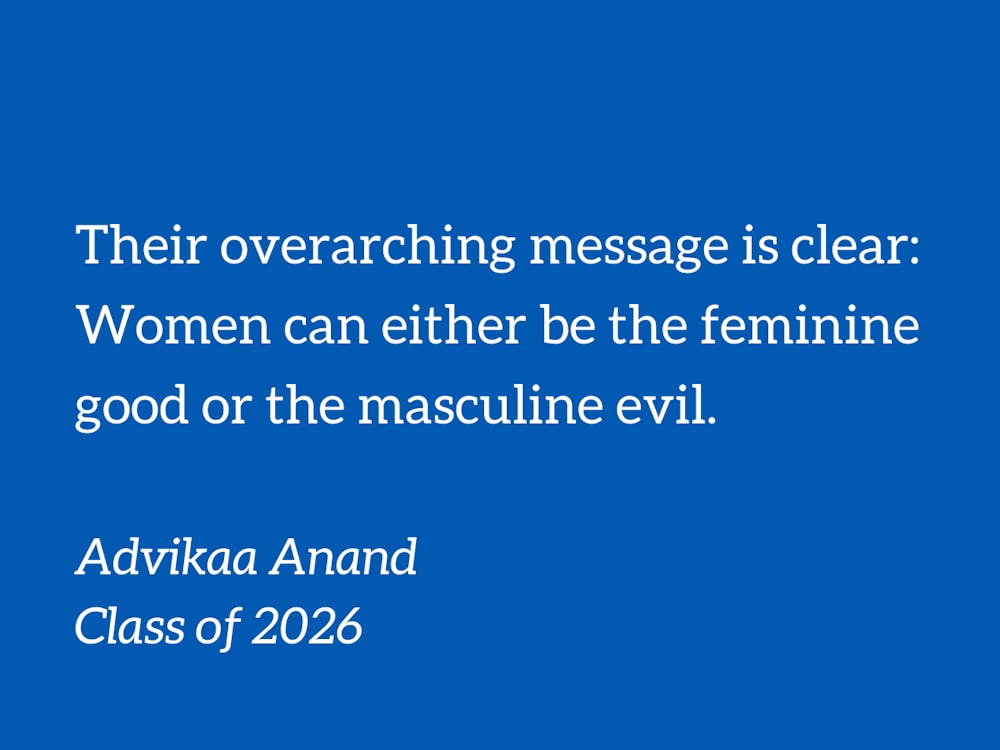As we computed the areas of scalene and obtuse triangles, my ninth-grade geometry group was discussing the latest updates in the football recruiting process for our town’s seniors. One boy remarked on the particularly impressive abilities of a graduating senior in the school across town.
“Nick Saban and Dabo Swinney are here to see him,” he shared with his friend sitting next to him, furiously shading in the area of a triangle.
“You mean the coaches of Alabama and Clemson?” I asked, looking up from my work. “Wow, that’s huge.”
Both boys stared back at me, their mouths agape. Surely, their athletically challenged, school-loving classmate knew nothing about football. But it was their response that was even more jarring.
“Wow, Advikaa,” one said, still bewildered. “I respect you so much more now.”
The implication of his extremely problematic statement was clear: I was only worthy of his respect if I displayed qualities that were contrary to a typical feminine identity; instead, I was more admirable if I was unexpectedly masculine — an emblem of the “not like other girls” trope so popularized in media today.
A new TikTok trend strives to capture exactly this frustration, mocking those girls who try to monopolize masculine attention by distinguishing themselves from other girls through a disdain for “girly” activities, such as wearing make-up, dressing up in flattering clothing or even consuming “feminine” foods — like a salad — instead of devouring a more greasy pizza — nicknamed the “pick-me” girl.
At first glance, this trend may seem like a defense of women and their display of “traditionally” feminine characteristics. With a closer look, however, it is clear that it is underpinned by the same internalized misogyny that characterizes the pick-me girl.
Of course, the pick-me is problematic — while pointing out how they are unique and therefore desirable, such girls often diminish other women and their self-worth.
But nor is the anti-pick-me the feminist undoing of this archetype. Instead, this attempt to deconstruct a byproduct of patriarchal societal values has created its own Frankenstein monster, enabling facile criticisms of women for any behavior seen as excessive – being too annoying, too attention-seeking, just too much.
As Dr. Christina Riley, professor of critical race theory, gender, and critical race studies at American University, explains, the ubiquitous presence of these skits on TV enables “everyone to add something to the list of grievances pitted against this figure, to the point where literally anything could qualify someone as a Pick-Me girl.” Ultimately, this trend further perpetuates the sexism it so vehemently strives to decry, “broaden[ing] the terms for women-bashing.”
Moreover, the anti-pick-me’s further exacerbate the gender binary that feminist activism has tried so hard to eradicate. Their overarching message is clear: Women can either be the feminine good or the masculine evil. Any girl who veers towards shedding her femininity by participating excessively in traditionally “male” activities does so on purpose and only for attention.
Yet, such an assumption completely fails to recognize that most women — and most humans — display a combination of traits that, collectively, are androgynous — neither typically feminine nor masculine. The trend reiterates the long-discredited fact that some activities are only for men and others only for women. It automatically assumes that any girl indulging in the former must be doing so for attention because clearly, a woman has no business more pressing than winning the attention, and ultimately, the affection of a man.
As Madeleine Webster, an avid social media consumer, puts it, “I’m always suspicious of a trend that blames women for sexism.”
While calling out pick-me behavior, we must acknowledge its predication on patriarchal expectations of female behavior, instead of overindulging in the systematic embarrassment and insult of those who display these tendencies. Often, such behavior results from an intrinsic need to feel better about one’s self and “to survive bullying, high school and cultural expectations.”
Although this behavior is harmful, it is equally harmful — not to mention reductive — to ascribe all female behavior that stands out as an attempt to win male attention. After all, how ironic is it that these self-proclaimed anti-pick-mes are themselves functioning on the same assumption that they see as so flawed within their pick-me counterparts?
Instead, as women, we must endeavor to genuinely have each other’s back, not criticizing other girls for being too outwardly “masculine” or “feminine” but instead encouraging them to be themselves — whatever androgynous shape that might assume. Human behavior is fluid and a product of circumstances, sometimes taking the form of extremes on the gender binary.
And that’s okay. It’s natural. It’s real. Assuming an attention-seeking motive behind female behavior diminishes women’s humanity and the gravity of experiences that converge to make us who we are.
Maybe that girl who you think wears the flashy blue football jersey to fit in with the guys actually dons it as a reminder of her father, who lives hundreds of miles away and sees her only once a year. Maybe that girl who wears bright red lipstick every time you see her does so as a token of her late mother, who loved red roses.
Women — like all humans — have stories, and the vast variations of their behavior cannot be confined by a singular, linear narrative.
Get The Chronicle straight to your inbox
Sign up for our weekly newsletter. Cancel at any time.
Women already excessively apologize because they fear they are too much — too needy, too imposing, too woman.
They don’t need to also say sorry because another woman doesn’t think they are woman enough.
To the anti-pick-mes: Woman up.
Advikaa Anand is a Trinity sophomore. Her column typically runs on alternating Thursdays.
Advikaa Anand is a Trinity sophomore and an opinion managing editor of The Chronicle's 119th volume.

